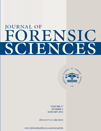Sudden and Unexpected Death from Pituitary Tumor Apoplexy
Abstract
Abstract: Pituitary tumor apoplexy refers to a clinical syndrome precipitated by the expansion of a pituitary adenoma by hemorrhage or infarction. Individuals may present with myriad signs, including sudden onset of severe headache, visual changes, altered mental status, cranial nerve palsies, and hormonal dysfunction. This disorder constitutes a medical emergency and warrants an expedited evaluation, diagnosis, and treatment to prevent the potential sequelae of permanent visual loss, endocrine abnormalities, or death. We report a case of sudden death from undiagnosed pituitary tumor apoplexy. The decedent was evaluated by medical personnel on three occasions in the week prior to her death for severe headache, nausea, vomiting, and photophobia. Postmortem examination demonstrated a hemorrhagic infarction of a pituitary adenoma with necrosis and expansion out of the sella turcica. The recognition of and treatment for a patient with pituitary tumor apoplexy requires a rapid multidisciplinary effort. Failure of prompt diagnosis may be fatal and require a medico-legal death investigation for sudden and unexpected death.




